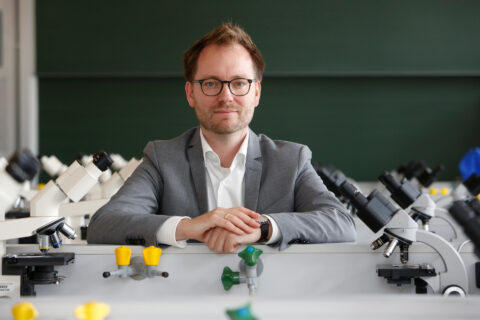FAU researcher Kilian Schober awarded 100,000 euros for research
Whether a killer T cell protects or damages our immune system depends on which antigen it binds to with its typical receptor. An adult human has around one hundred million different T cell receptors. Which antigens these receptors detect is still largely a mystery, above all when it comes to cancer and autoimmune diseases, but also for many infections.
PD Dr. Kilian Schober and his team of researchers at FAU are trying to shed some light on this mystery and he has now been given a Life Sciences Bridge Award worth 100,000 euros by the Aventis Foundation.
Investigating T cell receptors and their antigens
The T cells of our adaptive immune system protect us from infections and cancer, but can also turn against the body and cause autoimmune diseases. Whether they are beneficial or harmful to us depends which antigens they bind to in order to trigger an immune response. These antigens are small peptides.
For the cytotoxic T cells, which are the focus of Schober’s research at the Chair of Microbiology and Immunology of Infection, they usually comprise around nine amino acids. In special frames known as MHC-I molecules, they are displayed on the surface of nearly all cells in the body as something known as epitopes.
These are fragments of virus or cancer proteins that the diseased cell has shredded in its proteasome to signalize to the T cell to destroy it.
However, the problem is that every cell constantly shreds its own proteins leaving fragments of them to appear in the MHC frame as a kind of “proof of identity”. On their patrols through the body, every cytotoxic T cell comes across the inherent peptides of healthy cells, and must, in the midst of this immense background noise, find the foreign antigen that matches its specific receptor so that it does not mistakenly destroy healthy cells.
Using the yellow fever vaccine as a blueprint
When asked about his interest in this field of research, Kilian Schober explains, “which epitopes are detected as antigens by T cells and how the antigen specificity of their receptors influences the T cell response remains largely unanswered.”
This not only applies to cancer and autoimmune diseases, but also to several infectious diseases. Research has traditionally focused on a small number of viruses and neglected a large number of other pathogens. Vaccines are generally a good model system to track T cell responses on a clear time scale, says Schober, whose research focuses solely on human T cells.
The SARS-CoV-2 pandemic provided him with a unique research opportunity because a large number of people were suddenly systematically immunized.
However, the best model is the vaccine against yellow fever, which provides lifelong protection against the disease. “It is a blueprint for a successful immune response.” As the head of a research group from a EU Horizon collaborative project, Schober has been working since January 2024 on using this blueprint to analyze the immune response to West Nile and Zika viruses that are already present or will soon arrive in Europe due to climate change. Like yellow fever, both are caused by flaviviruses and there is currently no vaccine for either.
Gaining a better understanding of T cells
Where possible, Kilian Schober transfers what he has discovered from vaccine models to other disease models. The two technologies that allow him to advance to new dimensions of understanding for T cell responses are genome editing using CRISPR/Cas and single-cell RNA sequencing. With the latter, he can sequence all the active genes of a single T cell, including those of its receptor, and make precise genetic modifications to the receptor.
Based on findings that apply across all disease entities, he is working on engineering T cell receptors that he hopes will act like probes and guide him to their specific epitopes. “It is much easier to understand T cells once you know the antigen specificity of their receptors.” For this purpose, Schober and his team are currently working on setting up a library of T cell receptors and validated epitopes.
About the award winner Kilian Schober
As a clinician scientist who spends a quarter of his time working as a physician in microbiology, Kilian Schober has been head of the research group “Understanding and Engineering Human T Cell Immunity” at the Institute of Microbiology – Clinical Microbiology, Immunology and Hygiene at Universitätsklinikum Erlangen since 2021.
After completing his medical degree in Würzburg, he worked for seven years as a postdoctoral researcher in the group of Prof. Dirk Busch at Technische Universität München, where he received his habilitation with a thesis about the T cell receptor in 2022. He is well on the way to making significant contributions to solving the question as to how the antigen specificity and avidity of T cell receptors shape the immune response. New cell based immune therapies could be designed and developed on the basis of this knowledge.
“Understanding T cell responses on the molecular level is crucial for the development of effective immune therapies. Kilian Schober is carrying out pioneering work in this area,” says Prof. Dr. Werner Müller-Esterl, Chair of the jury of the Life Sciences Bridge Award. “With this award, we would like to help him on his path towards a permanent professorship.”
About the Life Science Bridge Award
The Life Sciences Bridge Award is one of the most prestigious awards for early career researchers in Germany. It is awarded each year to up to three prizewinners who carry out research at German universities. They each receive 100,000 euros, ten percent of which can be used for personal use and the rest to finance their research. The Aventis Foundation is an independent non-profit foundation based in Frankfurt am Main. It serves to promote art and culture as well as science, research and teaching.
Further information:
PD Dr. Kilian Schober
Chair of Microbiology and Immunology of Infection
Tel.: +49 9131 85-32644
kilian.schober@uk-erlangen.de
